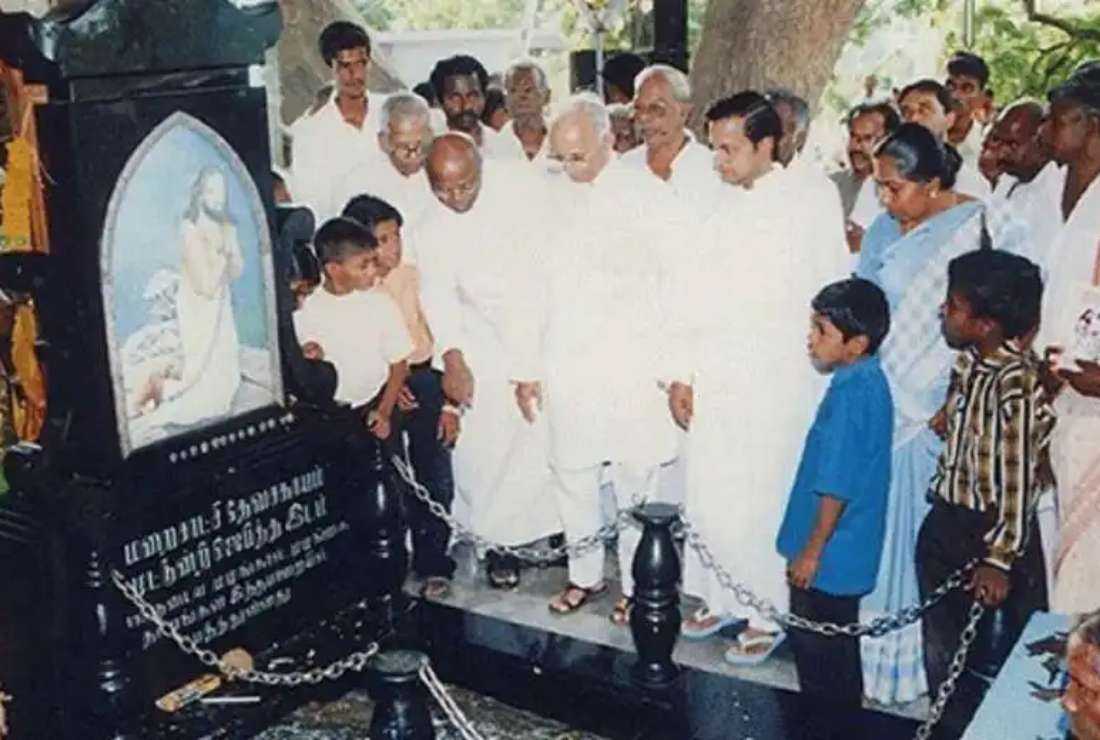
The tomb of Devasahayam Pillai in India's Tamil Nadu state. (Photo: UCA News)
Catholics have criticized a pro-Hindu publication for calling Devasahayam Pillai, the first Indian layman to be declared a saint, “a thief who was shot dead for his crime.”
The objectionable writing questioning the recent canonization titled “Devasahayam Pillai and Holy Sins” is published in the June 10 issue of Kesari, a Malayalam-language weekly known as a mouthpiece of the Hindu nationalist Rashtriya Swayamsevak Sangh (RSS) in southern India's Kerala state.
The three-page article by writer Murali Parapuram claimed that all the reasons cited by the Catholic Church for the sainthood are totally false because there was no spiritual transformation in him.
It further described St. Devasahayam as “a victim of religious conversion activities carried out by Christian missionaries” and charged the Church with “distorting history through fraudulent documents to promote their religious interests rather than any other concerns.”
“The RSS magazine is creating mistrust and confusion among the people and thereby whipping up communal discord,” said Father Michael Pulickal, secretary of the social harmony and vigilance commission of Kerala Catholic Bishops' Council.
The priest told UCA News on June 24 that the RSS on one hand was trying to create the impression that it wants to be friendly with Christians who make up 2.3 percent of the 1.3 billion people of India, but on the other hand it is trying to defame them.
Christian leaders elsewhere in Kerala rejected the article and appealed to the RSS to foster peace and development of the nation rather than attempting to divide people on religious lines
“This stand of the RSS is a double standard,” he said while alleging the Hindu nationalist organization and its affiliates including India’s ruling Bharatiya Janata Party “always target Christians under the guise of religious conversions.”
He said the baseless vitriol by Hindu groups against Christians has led to nuns traveling on a train being attacked. “We are peace-loving. We do not distort history for our advantage nor do we indulge in religious conversions,” Father Pulickal said.
He condemned the magazine article and appealed to RSS leaders to take immediate steps to end such malicious and false campaigns against minorities.
Advocate Biju Parayanilam, president of the Global Catholic Congress based in Kerala, said there was no doubt the article was published to defame Indian Christians. He urged the communist-run state government to initiate legal steps to end the malicious campaign.
Christian leaders elsewhere in Kerala rejected the article and appealed to the RSS to foster peace and development of the nation rather than attempting to divide people on religious lines.
The article on Devasahayam described the arrival and martyrdom of St. Thomas, the Apostle, as a lie and called the miracles attributed to St. Teresa of Calcutta a false narrative built by missionaries to promote Christianity.
St. Devasahayam was canonized by Pope Francis on May 15 after being declared blessed in 2012. A miracle attributed to him was recognized in 2014 and the Vatican cleared him for sainthood in 2020, leading to his canonization.
Devashayam was tortured daily en route to the forest with pepper being rubbed in his wounds and nostrils and fed with stagnant water while being exposed to the scorching sun
The saint was born an upper-caste Hindu in Nattalam, a village in present-day Kanyakumari district, on April 23, 1712. He was in royal service at the court of King Marthanda Varma, then ruler of Travancore state.
He converted to Christianity under the influence of a Dutch naval commander at the court and was baptized by Jesuit Father R. Bouttari Italus in 1745.
His given name Neelakanda Pillai was changed to Lazer, but he became popularly known as Devasahayam (God’s help). His wife, Bhargavi Ammal, also became Catholic and took the name Gnanapoo Ammal (Theresa).
The king ordered Devashayam’s arrest in 1749 and charged him with treason and espionage. Devasahayam was imprisoned, tortured and finally banished to the Aralvaimozhy forest, a remote border area of Travancore.
According to church documents, Devashayam was tortured daily en route to the forest with pepper being rubbed in his wounds and nostrils and fed with stagnant water while being exposed to the scorching sun.
He was shot dead in the forest on Jan 14, 1752, after being a Catholic for only seven years.
His mortal remains were interred inside what is now St. Francis Xavier’s Cathedral in Kottar, Nagercoil.


